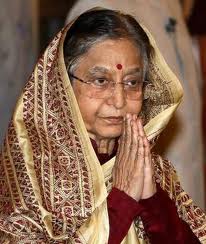 New Delhi, April 28: President Pratibha Patil on Friday wrote to Prime Minister Manmohan Singh about her decision not to move into what would have been her post-retirement accommodation in Pune. Her office said she was “pained” at allegations of her taking over land meant for “war widows” and “distortion of facts by the media.”
New Delhi, April 28: President Pratibha Patil on Friday wrote to Prime Minister Manmohan Singh about her decision not to move into what would have been her post-retirement accommodation in Pune. Her office said she was “pained” at allegations of her taking over land meant for “war widows” and “distortion of facts by the media.”
A controversy had broken out over the choice of land, owned by the Defence Ministry, and the scale on which the residence was being readied. An organisation of ex-servicemen in Pune had claimed that two British-era buildings would be knocked down to accommodate the building. Also, it said, the land was earmarked for war widows, an accusation the President's office claimed “led to a spiralling media attack.”
Negative reports
On Friday, the President's Office said: “She is deeply pained by the allegations about the land-grab. The negative reports about her post-retirement home were distressing and she has decided to forego her accommodation in Pune.”
“The President has not decided yet where her post-retirement home will be. She has just written to the Prime Minister her decision to forego the Pune accommodation,” an official said.
In a statement, the President's Office rebutted allegations that the land was identified for war widows, and cited examples of Ms. Patil's assistance to women and war widows in particular.
“The President has been reading and watching the unfolding of some fallacious observations regarding the accommodation in Pune, which she was to occupy after relinquishing the office of President. She chose not to react as she has always held herself answerable to the Constitution and her conscience. It was expected that once the facts were made public it would convince the concerned people. But despite clarifications given by the President's Secretariat, it is unfortunate that the misgivings continue to persist …” the statement read.
“…What has pained the President the most is the fact that she is now being portrayed by some people as one who, by agreeing to accept a defence accommodation for her post-retirement home, is insensitive to the cause of war widows and ex-servicemen. But facts are to the contrary,” the statement said.
To substantiate her concern for war widows, the statement included instances and media reports of how the President intervened and instructed various government agencies to take affirmative action. A case in point is that she, as Rajasthan Governor, instructed all District Collectors to inform her regularly of the progress in resolving the problems of war widows and that she ensured that the newly constructed ‘War Widows Hostel and Rehabilitation Centre' in Jaipur was allocated Rs. 2 crore from the Amalgamated Fund of the Governor.
The President's Office censured the media for continually running “programmes and polls” on the issue and “refusing to accept the clarification that was issued over the controversy.”
“Even after it was explained that the land owning agency will be the Ministry of Defence and that the land was never indicated as one earmarked for war widows, there was no end to the fallacious reportage. The President's Secretariat had made it clear that the land to be allotted to her was for use as her post-retirement residence only during her lifetime with no rights of ownership, transfer lease, etc.,” pointed out the official.





Comments
Add new comment